LONDON, Sept. 22, 2021 /PRNewswire/ -- The latest Purpose Report from global consultancy partnership Kearney has revealed that just 45% of companies have embedded purpose into their culture, and only 13% proactively campaign for issues related to their stated purpose.
Purpose has become a popular buzzword in recent years, often featuring in mission statements and forming a key component of company culture, as it provides a positive signal to stakeholders that businesses want to contribute to the welfare of society and the environment.
Consumers, workers, and stakeholders from all communities are more informed and have become activist on environmental, social, and governance issues than ever before. Being a good citizen alone has proved to be insufficient and many companies are under the spotlight for simply virtue-signalling via pronouncements, metrics and pledges.
Kearney's Purpose Quotient Index (PQI) compares organisations' aspirations to be purpose-oriented with how well they are delivering on these commitments, with the discrepancy between the two highlighting their 'purpose gap'. However, the purpose gap doesn't just exist between aspiration and execution; Kearney's data also revealed a difference of opinion within different groups in organisations.
The report findings showed CEOs to be far more positive about their company's purpose status than employees, with 36% claiming that the business has fully embedded its purpose in the organisation. Just 8% of the CEOs surveyed felt that their company needed to make a stronger impression in this area. Yet, more than half of entry level employees (53%) said that their organisation has yet to fully embed purpose, while nearly four in ten (39%) said that their company needs to make a stronger impression in this area.
To explore these issues further, Kearney has created a spectrum of purpose archetypes, with visionaries and pivoters who aspire to engage with purpose initiatives on one end, to highly engaged integrators and activists on the other. Again, perceptions of progress differed by role with over one third of CEOs scoring their companies as activists or integrators (36%) – which was nearly twice the percentage of middle management (20%).
Alex Liu, Managing Partner and Chairman of the Board at Kearney, comments:
"Despite most business leaders understanding the importance of purpose, our research reveals clear gaps between positive intent and meaningful outcomes.
These gaps are not just in the company's operations, but in its aspirations too, with C-suite employees perceiving the organisation's progress quite differently to middle managers and entry level employees. This needs to be reconciled. Being a good citizen alone is no longer sufficient.
Leaders also need to examine how their product lines, supply chains and business operations can become more diverse, fair and climate-conscious. They need to ask themselves if they can activate purpose to drive lasting competitive advantage and inspire teams into a more joyful and ethical workplace culture.
The urgency is high: consumers, workers, and stakeholders from all communities are more informed and activist on environmental, social, and governance issues than ever before. This presents a huge opportunity for today's leaders: companies that do good, and be good, will thrive."
Notes to editors
Kearney recently collaborated with Bloomberg on a roundtable discussing putting purpose into action with global leaders, which can be seen here.
Methodology
Kearney's Purpose Quotient Index (PQI) combines the responses of more than 300 CEOs and CXOs, 300 middle managers, and 200+ entry-level employees from the private sector across Asia-Pacific, Europe, the Middle East, and North America to build a view of the purpose gap globally, test the similarities and differences between companies across industries, and investigate where the gaps exist. Kearney's PQI explores the areas in which organizations intend to create shared public value (the level of aspiration) versus how well they are delivering on their commitments (the level of execution). By plotting both sets of results, we can determine an organization's "purpose quotient," and which of the five purpose archetypes they fall into. The goal of the PQI is to develop an understanding of purpose gaps within organizations and across industries, and identify areas where organizations most need to put their purpose into action.
About Kearney
Kearney is a leading global management consulting firm with deep-rooted expertise in strategic transformation. We work with more than three-quarters of the Fortune Global 500, as well as with government bodies and non-profit organizations. As a global consulting partnership in more than 40 countries, our people make us who we are. We're individuals who take as much joy from those we work with as the work itself. Driven to be the difference between a big idea and making it happen, we help our clients break through. To learn more about Kearney, please visit www.kearney.com.
Media Contact: Ryan Dicovitsky / Ellie Johnson
Dukas Linden Public Relations
[email protected] / [email protected]
212-704-7385
SOURCE Kearney

Related Links
WANT YOUR COMPANY'S NEWS FEATURED ON PRNEWSWIRE.COM?
Newsrooms &
Influencers
Digital Media
Outlets
Journalists
Opted In





Share this article